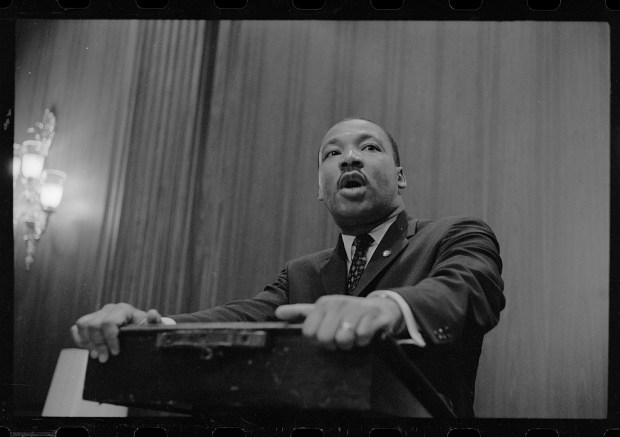As we take time to celebrate the legacy of Dr. Martin Luther King, Jr., on January 15, it’s inspiring to learn a little more about the source of his courage and strength, which was his faith in Jesus.
King cannot be understood apart from his Christian faith. As a religious minister raised in a family of religious ministers, King was deeply shaped by the words of the Bible and the traditions of the Black church in the United States. As one professor said, “He was a churchman from beginning to end.”
Not many people know that King considered becoming a doctor and then a lawyer before finally answering the call he felt from God to become a minister. The way he responded to that call offers a fascinating glimpse into what entering a vocation can look like.
No burning bush or blinding light
Almost a decade before he died, he shared his “vocation story” with Joan Thatcher, publicity director of the American Baptist Convention. In her request to hear his story, Thatcher noted, “Apparently many of our young people still feel that unless they see a burning bush or a blinding light on the road Damascus, they haven’t been called.”
Instead, King’s call was something slow yet insistent. Even though he grew up, as he put it, “the son of a Baptist preacher, the grandson of a Baptist preacher and the great-grandson of a Baptist preacher,” it wasn’t a foregone conclusion that he would also take the cloth.
He wrote, in his statement to Thatcher, the following:
My call to the ministry was neither dramatic nor spectacular. It came neither by some miraculous vision nor by some blinding light experience on the road of life. Moreover, it did not come as a sudden realization. Rather, it was a response to an inner urge that gradually came upon me. This urge expressed itself in a desire to serve God and humanity, and the feeling that my talent and my commitment could best be expressed through the ministry.

"An undying urge"
Although he saw much good in the roles of a doctor or lawyer, he couldn’t shake the feeling that God wanted him to serve as a Baptist minister:
At first, I planned to be a physician; then I turned my attention in the direction of law. But as I passed through the preparation stages of these two professions, I still felt within that undying urge to serve God and humanity through the ministry.
At last, he came to a powerful and startling realization: If he failed to answer the call God put on his life, he would only find himself more and more frustrated. The realization led him to “accept the challenge” that he believed God wanted of him. He said:
During my senior year in college, I finally decided to accept the challenge to enter the ministry. I came to see that God had placed a responsibility upon my shoulders and the more I tried to escape it the more frustrated I would become.
A few months after preaching my first sermon I entered theological seminary. This, in brief, is an account of my call and pilgrimage to the ministry.

A quiet, slow insistence
There is something incredibly simple about his story, lacking as it does any flash of lightning or major “wow” moment. Yet this quiet, slow insistence is often exactly how God calls.
A voice deep in our hearts speaks to us of something outside our current experience, and it is in answering this call with courage that we begin to live freely and deeply the life God desires for us.
As we honor the life and legacy of King, who before anything else was first and foremost a preacher of the Good News of Jesus Christ, may we find inspiration to answer the call God has put upon our own hearts.



